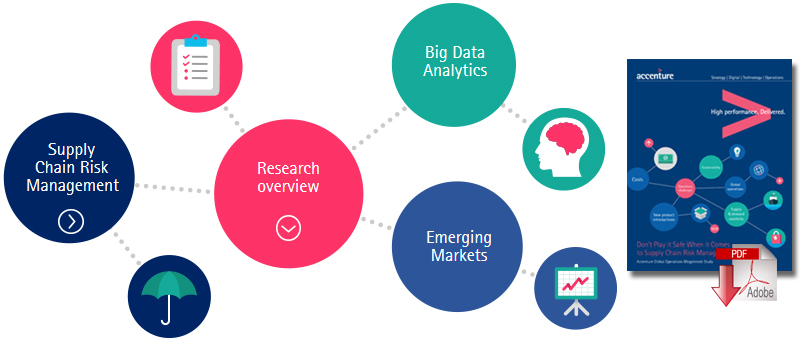Supply Chain Risk Management Now a Priority for Most Businesses
Information technology, costs and pricing factors, and the global economy viewed as top sources of supply chain risk by corporate executives, but only elite leaders generate a return on their investments in excess of 100 Percent, Accenture research finds.
The majority of companies see supply chain risk management as important to their business, but only seven percent are generating returns of over 100 percent on their supply chain risk management investments, according to a new study by Accenture that revealed the distinct approaches followed by leaders in risk management.
Seventy-six percent of companies participating in the “Accenture Global Operations Megatrends Study – Focus on Risk Management ,” describe supply chain risk management as important or very important.
Of the more than 1000 companies represented across 10 industries, 25 percent plan increased investments of at least 20 percent in supply chain risk management in the next two years.
The analysis reveals that while nearly all of the companies represented in the study receive a return on their investment (ROI) in risk management, the leaders—those that generated returns exceeding 100 percent – had three practices in common that distinguished them from others.
- Make risk management a priority. Sixty-one percent of the leaders as compared to 37 percent of other companies make risk management a strategic imperative and recognize the importance of capabilities that help them gain greater visibility and predictability across their supply chains.
- Centralize their responsibility for risk management. Forty-three percent of leaders versus 32 percent of others had a central risk management function led by an executive in the C-suite or a vice president who oversees all of their risk management activities.
- Invest aggressively in risk management with a specific focus on end-to-end supply chain visibility and analytics. Leaders were nearly three times as likely to say they planned to boost their investment in risk management by 20 percent or more in the next two years. Furthermore, nearly 70 percent of leaders said their investments will generate a return of at least 100 percent in the next two years as opposed to 4 percent of others.
“As demonstrated by the leaders in our study, a centralized, top-down approach to supply chain risk management tends to generate the highest ROI on risk management,” said Mark H. Pearson, senior managing director, Accenture Strategy, Operations. “Such a commitment to risk management also can help managers guard against business disruptions in the wake of natural disasters, geo political events, shifts in commodity or shipping prices, or any number of circumstances that can endanger a company’s operations.”
Pearson also noted that such a strong commitment to risk management “can contribute to stakeholder confidence in the fundamentals underpinning a company’s business.”
According to the study, the top three sources of risks identified by senior operations executives are information technology (39 percent), cost and pricing factors (39 percent) and the global economy (37 percent). Natural disasters or unforeseen events, such as the Thai floods or the tsunami in Japan, were only cited by 17 percent of the respondents, making that the least frequently flagged risk.
The areas most frequently exposed to those and other risks in the corporate supply chains are quality (45 percent), planning (39 percent), supply chain skills and talent (38 percent) and sourcing and procurement (37 percent), according to the executives.
“Although unforeseen events or natural disasters lead some to give up on risk management, most risks can be managed to not only minimize the downside but also to gain a competitive advantage as a result of being prepared to respond to circumstances when they arise,” said Pearson. “Scenario planning and robust analytics can play a key role in developing effective risk mitigation strategies.”
Don’t Play it Safe When it Comes to Supply Chain Risk Management

About the Study
The Accenture Global Operations Megatrends research is designed to explore key trends in the operations function. With an initial focus on supply chain risk management – a priority and top concern among supply chain executives at primarily large global companies, the study examined how companies are approaching their supply chain risk management and the effectiveness of those strategies and tactics. The study included a survey of 1,014 senior executives – 56 percent of which included chief supply chain officers, chief procurement officers, chief sourcing officers, chief operations officers and chief operating officers. Nearly half of the represented companies (48 percent) had revenues in excess of $5 billion, with 18 percent having revenues exceeding $10 billion. With headquarters evenly split across Asia Pacific, Europe and North America, the respondents represented the electronics & high tech, consumer goods & services, industrial equipment, banking, retail, communications, health providers, energy, chemicals and utility industries.














